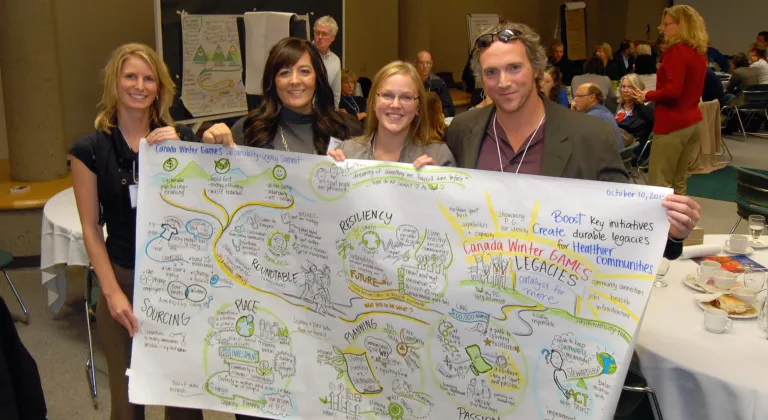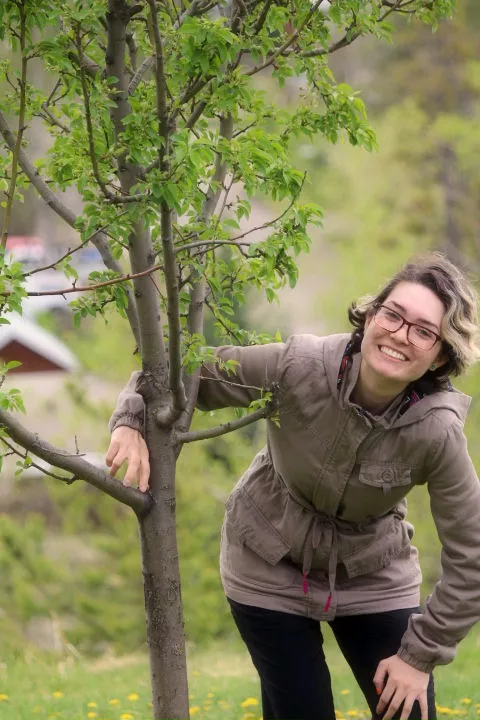Canada's Green Alumni - An interview with Mike Peterson
A Green Alumni Interview with Mike Peterson
By Gala Munoz-Carrier
Meet Mike Peterson: UNBC Wildlife Biology and MBA Alumni, Project Assessment Manager at the BC Environmental Assessment Office, and the Environment Chair for the 2015 Canada Winter Games. With such an inclination towards sustainability and the environment, the Green Centre wanted to know how being at Canada’s Green University shaped Mike’s experience at UNBC and in his personal and professional life since graduating.
Mike’s motivations for attending post-secondary came as a result of growing up on a farm and being around animals. Unfortunately, due to some “tomfoolery” in the beginning of his university career he wasn’t accepted into vet school. So he opted for the next best thing: wildlife biology. He attributes the “hands on” approach and interdisciplinary elements of both his degree and the university to his desire to search for a similar setting professionally: “I didn’t just do wildlife biology… I saw how biology interacts with the forestry sector, the environmental sector, etc. so I think I always kept that in mind when going into my career.” For similar reasons, Mike decided against doing a master’s program that focused on one scientific discipline too much. Despite being impressed by the professors available for such a program, Mike instead decided on returning to UNBC for his MBA to become a more well-rounded professional.
Since his graduation day at UNBC, Mike has entered the professional world wearing many different hats. He has been involved with a consulting company that bridged forestry and the environment as well as a natural resource management company with a focus on construction management. Subsequently he tried his hand at being an environmental coordinator at a coal mine for a year. With his latest career move - joining the provincial government – Mike started out as a section head for ecosystems and in the six years since has shifted to the Environmental Assessment Office where he facilitates reviews of proposed major industrial projects (e.g. coal mine and aggregate projects).

Soon after Prince George won the bid to host the 2015 Canada Winter Games, Mike volunteered to become the Environment Chair. With an interest in both sustainability and competitive sports, he saw this opportunity as a perfect fit. Despite no “real formal [job] description” of what it means to be the Environment Chair of the Games, Mike suggests three main components: recycling, solid waste and snow removal. Being that these are what he considers “conventional themes,” his aim is to try to encourage more stewardship and sustainability elements into the Winter Games.
Recounting his personal experience at the university and also the progress it has made since his days spent in the UNBC halls, Mike believes in the positive influence UNBC has had to the northern region. He attributes the university as being a significant reason why the community of Prince George has diversified and become a lot more attractive to young professionals: in particular professors who are “renowned” for their research and teaching and who have come and stayed in Prince George “because they care.” In Mike’s eyes, the university has been critical to “the north caring for the north and focusing on seeing the north prosper.”
When it comes to furthering its mission of Canada’s Green University, Mike suggests that UNBC take advantage of its role in the community as a sustainability leader. He believes in the university’s ability to influence change in the culture of “some of the larger organizations and industries who maybe aren’t considering sustainability elements.” Partnerships can lend themselves to “influence that can build over time” and facilitating positive reinforcement will help “sell” sustainability to those who might not otherwise consider it. Mike also encourages the university to relay the message that sustainability can be both good for the environment and “the bottom line,” especially in an economy that is on the rebound. Above all, given that Prince George is an operational town Mike emphasized the importance of getting out “on the ground” and “demonstrating how sustainability can be a real life thing” and how this approach will be more readily accepted by the city as a whole. Given his busy schedule and numerous commitments, we appreciate Mike’s advocacy for sustainability within the Canada Winter Games and his encouragement towards the university’s accomplishments and goals from past to present.
About the Author

As a life long resident of Prince George, I love the accessibility of both the urban and the natural that this city has to offer. I am 4/5ths of the way through my joint degree in Environmental Studies and English and I hope to be an Environmental Journalist at the end of my studies.
- Gala Munoz-Carrier